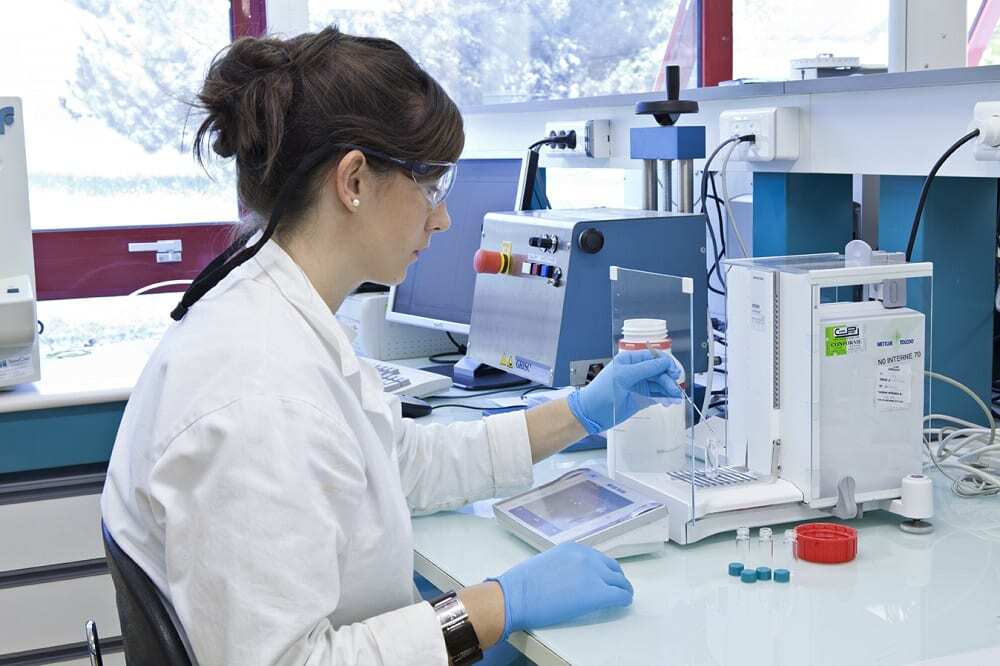Quality Control Analysts check or test the product of a manufacturing process to make sure that it meets predefined quality or safety standards. The completion of this quality check ensures that the final product is safe for sale or distribution. They work in a range of industries such as car, electronics, aircraft, food and drink and pharmaceutical manufacturing.
Some companies might call this role…
- Quality Control Associate
- Quality Control Technician
- QC Specialist
- QC Stability Coordinator (Senior Analyst)
Let’s take a closer look at the details of quality control and the role of a Quality Control Analyst.
What is Quality Control (QC)?
Quality Control is product-oriented and focuses on testing a sample of a manufacturing process to make sure it meets the required design specifications or quality standards. The product can then be released to the next stage of the production process or deemed suitable to be released for sale or distribution. 100% sampling or Statistical Process Control (SPC) are some of the more widely used techniques in quality control.
The Quality Control department will test the product at various points along the manufacturing process as well as testing the final product. Each test measurement is compared to the standards as defined in the Standard Operating Procedures (SOPs).
If the test shows the product deviates from the standard it could be destroyed or reworked (depending on the industry) and actions taken to adjust the manufacturing process to ensure it doesn’t happen again.
The standards that test measurements are compared with are internal standards, external regulations and industry-wide standards. Clear documentation must be kept to show that rigorous Quality Control has been carried out before products were authorised for release.
The types of tests used vary greatly depending on the product or industry
In pharmaceutical manufacturing, quality control includes ensuring the product does not make a patient sick, so the company performs chemical and microbiological testing of samples from the production line. As the sample testing is done in a laboratory, people who work in quality control usually have a laboratory/science background.
In automobile manufacturing, quality control focuses on how machining tolerances and how well parts fit together to make sure the engines operate smoothly and efficiently.
In electronics, quality testing could involve using meters that measure the flow of electricity.
In all cases, a defective product can mean significant harm to a patient, driver or pedestrian or consumer. Maintaining the highest levels of product quality is essential.
What Does a Quality Control Analyst Do?
Quality Control Analysts are also sometimes referred to as Quality Control Associates, Quality Control Technicians or Quality Control Specialists. The tasks assigned to any one individual can vary greatly depending on the product being produced, but tasks might include:
- Inspecting, checking and testing products to confirm they meet quality standards or relevant legislation.
- Keeping accurate results of inspections, checks and tests.
- When defects are found – make sure they are analysed and carefully logged into production documentation.
- Ensuring that measuring and testing equipment are set up and working properly.
- Conducting root cause analysis to find the sources of defects or quality problems.
- Conducting risk assessment analysis to pre-empt and quality problems or issues.
- Testing products bought in from suppliers.
- Providing assistance to production staff where necessary regarding Quality Control procedures
- Completion of documentation to show that tests have been carried out and recording whether the product met the standards or not
- Collecting information and writing up reports on any findings to be passed on to managers
- Work together with QC and other departments to find solutions and implement new protocols and procedures in response to deviations
- Compiling test measurements and outcomes into reports for senior colleagues
What Does a Quality Control Analyst Do in Pharmaceutical Manufacturing?
QC Analyst conduct quality control testing in the pharmaceutical manufacturing industry to ensure the safety, efficacy, and consistency of products through rigorous analysis at every stage, from raw materials to finished products. Here is a breakdown of the steps they take.
- Raw Material Control
- Selection: Raw materials are selected based on strict criteria.
- Testing: Materials are tested for purity, potency, and contamination.
- Documentation: Detailed records are maintained for traceability and compliance.
- In-Process Control
- Monitoring: Continuous monitoring of the production process ensures consistency and detects any deviations.
- Sampling and Testing: Regular sampling and testing of intermediate products to ensure they meet quality standards.
- Finished Product Testing
- Identity Testing: Confirms the presence of the active ingredient (API).
- Purity and Potency Testing: Ensures the product is free from impurities and has the correct potency.
- Stability Testing: Assesses the product’s shelf life and how it changes over time under various conditions.
- Documentation and Record Keeping
- Batch Records: Detailed records of each production batch, including all tests and results.
- Compliance Documentation: Ensures all processes comply with regulatory requirements.
- Final Product Release
- Quality Assurance (QA) Oversight: QA teams ensure that all QC processes are followed and that the final product meets all quality standards.
- Review and Approval: All test results and documentation are reviewed before the product is released to the market by the Qualified Person (QP).
Watch this Video on a Quality Control Analyst’s Role
Take a look at this short video from the About Bioscience website, produced by the North Carolina Association for Biomedical Research (NCABR). It gives a great outline of a ‘day in the life’ of a Quality Control Analyst.
How Do You Become a Quality Control Analyst?
The paths into a Quality Control Analyst’s role are wide and varied and depend on the particular sector you are working such as manufacturing, the service sector, pharmaceutical or medical device manufacturing, software development, aviation, oil and gas, regulatory compliance, etc.
Some employers accept a high school-level education in science subjects and relevant industry experience, especially for those employees possessing the key attributes. Many companies will provide on-the-job training in quality control systems to candidates showing the right traits and skills.
Others may want you to have an associate degree in a relevant engineering or laboratory science discipline while others may require a bachelor of Engineering or Science (B.S.) degree in chemistry or biology.
Certifications can also help your career prospects in certain countries (Do note that recognition of qualifications varies from industry to industry). For example, The American Society for Quality offers a Quality Certification along with other industry certifications that deal with various aspects of quality practices.
What Skills Do I Need?
The ideal skill set for someone moving into Quality Control includes:
- Team working – Quality Control Analysts and Associates often work in teams to gather and analyse data
- Keen attention to detail – must be able to quickly spot when something isn’t correct and take effective action, catching a problem early can reduce wasted time and product
- Good communication skills – this role requires working with people from across the manufacturing process and often working with production staff to discuss defects, adherence to protocols and implementing new quality SOPs.
- Excellent written communication – documentation is a key feature of these roles and an essential requirement of industry compliance
- Prioritisation skills – often working to deadlines and ensuring the manufacturing process is working efficiently at every stage, must be able to prioritise workload
Quality Control Analysts in the Pharmaceutical Industry
If you already work in quality control in nutritional, beverage, food, or dairy manufacturing or similar industry and would like to retrain to perform the same or similar role within the pharmaceutical or medical device industry, check out our “Conversion Course into Pharma for Scientists”.
This program is the quickest way to learn all you need to, to successfully move into Quality Control or Quality Assurance roles in Pharmaceutical or Medical Device manufacturing from a different industry.
Depending on your previous experience, here are some of the most common quality control related job titles we see advertised;
- Quality Control
- Quality Control Microbiology Analyst
- Quality Control Specialist,
- Quality Control Analyst FTC
- Senior Quality Control Analyst
- QC Analyst, QC Scientist
- QC Micro Technician
- QC Microbiology Analyst
- QC Drug Product Technologist
- QC Stability Co-ordinator (Senior Analyst)
- QC Specialist -LIMS
- QC Biochemist UA
Quality Control Analysts Salaries and Job Growth
Check out our salary guide for Quality Control Analyst’s salary information local to you.
Quality Control Analyst’s Resume Tips
As with all resumes, it’s extremely important that you tailor your Quality Control Analyst’s resume to reflect the language used within the job advert. Where you have relevant experience or skills, use the words and phrases that the employer has used to describe them. Do not assume that someone will read similar wording and know what you mean.
Quality Control Analyst’s roles will typically be looking for the skills previously outlined:
- Team working
- Keen attention to detail
- Good communication skills
- Excellent written communication
- Prioritisation skills
For more help with your resume, check out these templates and this list of 30 tips to improve your resume.
Quality Control Analyst’s Job Vacancies in Pharma
For more information on currently available Quality Control Analysts roles, head to our pharmaceutical jobs board for Ireland and our pharmaceutical jobs board for the UK and select Quality in the “Jobs by Category” menu.
Other Pharma Job Roles
Manufacturing/Production
- Process Technician
- Process Operator
- Manufacturing Technician
- Production Operator
- Packaging Operator
- Production Supervisor
Engineering
- Process Engineer
- Manufacturing Engineer
- Instrumentation Engineer
- Project Engineer
- Automation Engineer
Maintenance
Quality
Science/Laboratory
Validation
Our Most Popular Programs and Courses
- Equipment Validation (IQ OQ PQ) Training Course – For Starter Validation, CQV and C&Q roles
- Pharmaceutical Validation Training Course – For Senior Validation, CQV and C&Q roles
- Computer System Validation Training Course
- GMP Training for the Pharmaceutical Industry
- View All 13 Pharmaceutical Industry Courses
About the Author
Donagh Fitzgerald
Head of Marketing & Product Development
Mechanical/Production Engineer
Donagh looks after the marketing and product development including the training and pedagogical elements of our programs and makes sure that all GetReskilled’s users can have a great online learning experience. Donagh has lived and worked in many countries including Ireland, America, the UK, Singapore, Hong Kong and Japan. Donagh has also served as the Program Manager for the Farmleigh Fellowship based out of Singapore.
Donagh holds Degrees in Production Engineering and Mechanical Engineering from South East Technological University, Ireland.
Claire Wilson
Content Marketing and Career Coaching
Claire runs GetReskilled’s Advanced Career Coaching Programme – our specially devised job hunting course that helps our trainees take that final step into employment by leading them through the job hunting process. She is extremely enthusiastic about helping people reach their final goal of employment in their new career path.
Claire has a BSc (Hons) in Medical Biology from Edinburgh University and spent 7 years working in the pharmaceutical and medical device industries.



Post Your Comments Below